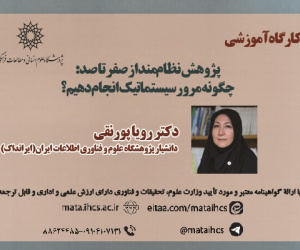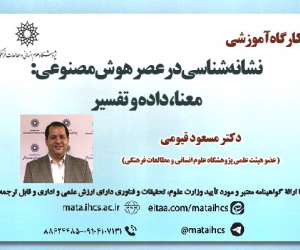بررسی لذّت خداوند، مبانی الهیاتی و پیامدهای آن در سنت فلسفی مشاء (واکاوی آرای ارسطو، فارابی و ابن سینا)
آرشیو
چکیده
لذت یکی از مهمترین مسائلی است که ذهن بشر را از دیرباز به خود معطوف کرده است. فیلسوفان لذت را عبارت از ادراک امر ملائم دانسته اند. در سنت فلسفی مشاء مباحث مختلفی از جمله در زمینه چیستی لذت، اقسام آن، فرآیند حصول آن و موارد دیگر طرح شده است. یکی از مهم ترین پرسش های فلسفی در این زمینه آن است که آیا خداوند نیز لذت می برد؟ فیلسوفان مشاء از جمله ارسطو، فارابی و ابن سینا هر سه بر این مسئله اذعان داشته و در مسیری تکاملی و با اختلافی اندک مبانی الهیاتی ویژه ای را برای اثبات و به دست دادن توضیحی ممکن به شیوه فلسفی از چگونگی حصول لذت در ذات الهی طرح کرده اند. بر اساس نظریات این اندیشمندان، وجود خدا به نحو وجوب تحقق دارد. این وجوب سبب تحقق کمالات فعلی بی انتهایی برای خدا شده است که زیبایی او به شمار می رود. خدا که فوق تجرّد و عقل محض است، زیبایی خود را به قوی ترین شکل ادراک می کند. ادراک زیبایی بی نهایت، لذت و در پی آن نیکبختی و عشقی بی نهایت در ذات الهی به بار می نشاند. این پژوهش به روش توصیفی تحلیلی و به شیوه کتابخانه ای صورت گرفته است.Examining God's pleasure, theological foundations and its consequences in Masha's philosophical tradition (Analysis of the opinions of Aristotle, Farabi and Ave Sina).
Pleasure is one of the most important issues that has focused the human mind for a long time. Philosophers have considered pleasure to be the perception of what is appropriate. In the philosophical tradition of Masha, various topics have been discussed, including the nature of pleasure, its types, the process of obtaining it, and other issues. One of the most important philosophical questions in this field is whether God also enjoys? Philosophers of Masha, including Aristotle, Farabi and Ibn Sina, all three have acknowledged this issue and in an evolutionary path and with a slight difference, they have proposed special theological foundations to prove and provide a possible explanation in a philosophical way of how to achieve pleasure in the divine nature. According to the ideas of these thinkers, the existence of God must be realized. This obligation has led to the realization of endless current perfections for God, which is considered His beauty. God, who is above celibacy and pure reason, perceives his beauty in the strongest way. The perception of infinite beauty brings pleasure and then happiness and infinite love in the divine essence. This research has been carried out in a descriptive, analytical and library method.







